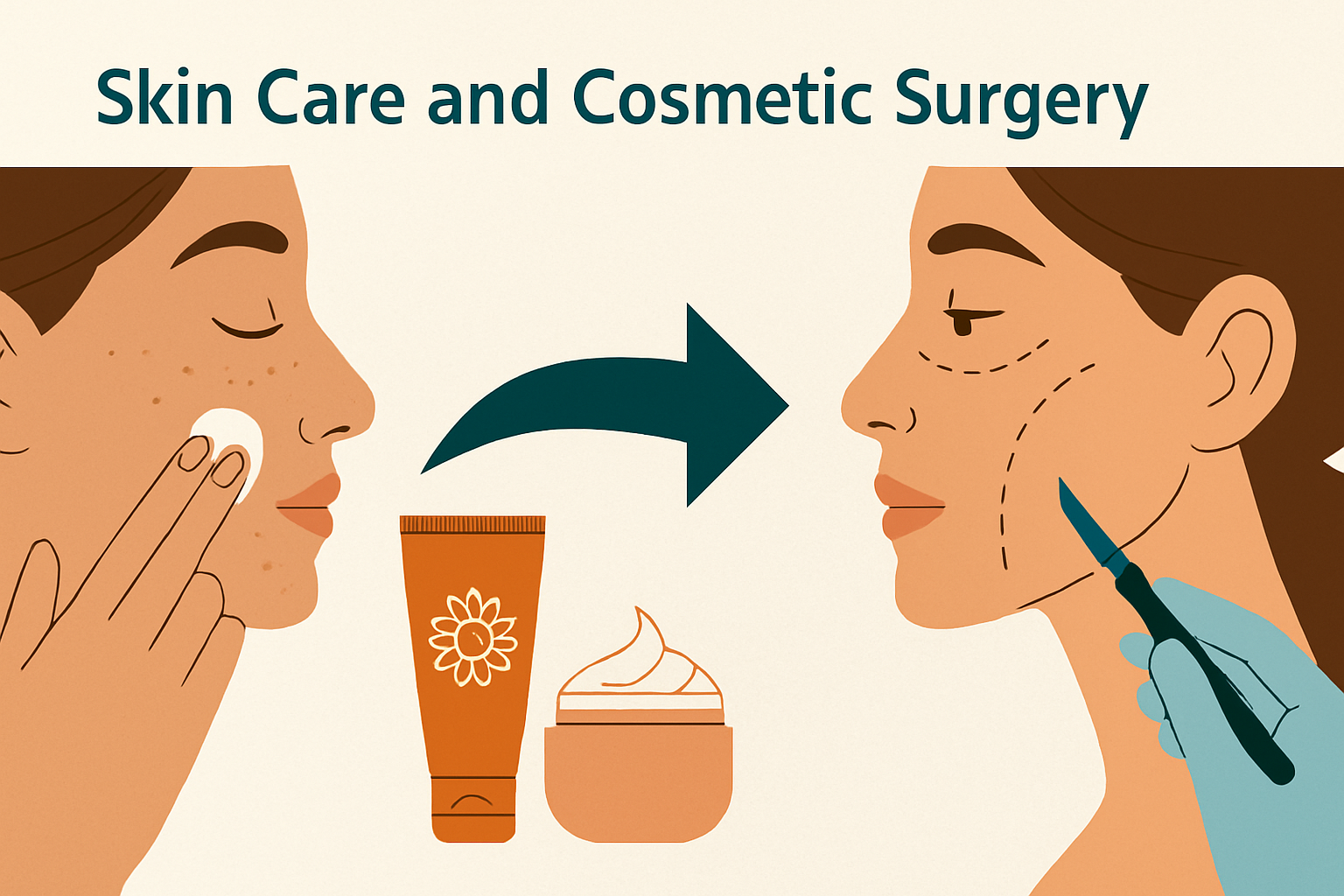In the world of aesthetic medicine, there’s an often-overlooked truth: beautiful cosmetic surgery results are built on the foundation of healthy skin. While the sculpting and reshaping that a skilled surgeon performs are essential, your skin’s condition plays a powerful, often decisive role in how those results appear — and how long they last.
That’s why Dr. Vashisht Dikshit, an aesthetic surgery expert in Mumbai, emphasizes something many don’t consider until it’s too late: skin health isn’t an afterthought — it’s the starting point.
In this blog, we’ll walk you through why skin preparation before plastic surgery is crucial, what to expect after cosmetic surgery, and how to build a skincare regimen that supports long-term results. Whether you’re planning a facelift, rhinoplasty, or body contouring, these insights are for you.
The Skin-Surgery Connection: Why Skin Health Matters
Skin is not just the outermost layer of your body — it’s a complex, dynamic organ that plays a critical role in the healing process after surgery, the aesthetic quality of surgical outcomes, and even the risk of complications.
During cosmetic surgery, your skin is often manipulated, lifted, stitched, or incised. The resilience, hydration level, elasticity, and barrier integrity of your skin all determine how well it tolerates this stress — and how quickly it recovers.
Here’s how it impacts results:
-
Poor skin elasticity can affect the success of lifting procedures like facelifts or blepharoplasty, leading to less dramatic results.
-
Compromised skin barrier function increases the risk of post-op infections, delayed healing, or scarring.
-
Skin prone to inflammation or acne may flare post-op, especially if corticosteroids are used in recovery.
-
Dry, flaky skin doesn’t hold sutures well and is more prone to tension-related scarring.
This is why Dr. Vashisht Dikshit, a trusted plastic surgeon for cosmetic care in Mumbai, always begins with a thorough dermal health evaluation before recommending any procedure.
Pre-Surgery Skin Care: What You Need to Know
Preparing your skin before surgery isn’t optional — it’s essential. The condition of your skin at the time of surgery will directly impact the ease of the procedure and the quality of healing afterward.
Step 1: Build a Barrier-Strengthening Routine
The goal here is to enhance your skin’s resilience and reduce transepidermal water loss (TEWL). A strong skin barrier reduces post-operative irritation and speeds healing.
-
Use ceramide-rich moisturizers twice daily to support lipid layers.
-
Avoid exfoliants or peels for 1–2 weeks before surgery.
-
Sunscreen is non-negotiable — UV damage before surgery increases risks of pigmentation changes after.
Step 2: Calm Inflammation and Active Breakouts
If your skin is acne-prone or inflamed, it’s best to treat it before your procedure. Acne lesions near the incision site can introduce bacteria into healing wounds.
-
Topical anti-inflammatory agents such as azelaic acid may be prescribed.
-
Oral antibiotics or anti-acne therapy might be recommended for severe breakouts.
-
Avoid retinoids 7–10 days before surgery unless cleared by your surgeon.
Step 3: Nutrition & Supplements for Skin
Your skin also reflects your internal health. Certain micronutrients are critical for wound healing and collagen regeneration:
-
Vitamin C: Enhances collagen synthesis and reduces inflammation.
-
Zinc: Vital for immune response and skin repair.
-
Hydration: Keep your skin supple by drinking 2.5–3 liters of water daily.
Post-Surgery Skin Care: Supporting Healing from the Outside-In
Once your surgery is complete, your skin enters a critical regeneration phase. This period determines the quality of your final results — smoothness, tone, tightness, and evenness.
Here’s how to care for your skin after surgery:
Immediate Post-Op Period (0–7 days)
-
Follow all post-operative instructions exactly — this includes dressing changes, hygiene protocols, and activity restrictions.
-
Do not apply any active skincare ingredients (like acids, retinoids, or vitamin C) unless prescribed.
-
Use only what your surgeon provides — typically a gentle, pH-balanced cleanser and a healing ointment.
The Repair Phase (1–4 weeks)
This is when collagen production ramps up and skin starts to re-epithelialize. You may experience itching, tightness, or dryness.
-
Apply topical healing agents such as petrolatum, hyaluronic acid-based creams, or silicone gels to minimize scarring.
-
Don’t pick or scratch healing skin, even if it peels or scabs slightly.
-
Gentle lymphatic massage (if approved by your surgeon) can help reduce swelling and improve circulation.
UV Protection: Your Skin’s Best Friend
Healing skin is photosensitive. Even minimal UV exposure can cause post-inflammatory hyperpigmentation (PIH), especially in Indian skin tones.
-
Use a broad-spectrum SPF 50 daily, even indoors.
-
Wear wide-brimmed hats or seek shade when outside.
-
Avoid tanning, direct sun exposure, and heat-heavy environments (like saunas) for 4–6 weeks.
The Science Behind It All: Why This Matters
Let’s talk technicalities for a moment:
-
Collagen remodeling continues for 3–6 months after surgery. Supporting this with proper skincare enhances long-term tightening effects.
-
Skin elasticity and surgery go hand in hand — younger, more elastic skin bounces back faster and adapts to the new contours better.
-
Poor skin condition can lead to hypertrophic scarring or keloids, especially in genetically predisposed patients.
-
Inflammation control using post-op care prevents fibroblast overactivation, reducing unwanted tissue build-up.
Aesthetic surgery is not a “set it and forget it” solution. It’s a collaboration between you and your surgeon, with skin care playing a vital role.
Start Your Skin-First Cosmetic Journey
Healthy skin is the foundation of stunning cosmetic results. Book a consultation with Dr. Vashisht Dikshit in Mumbai to get a personalized skin and surgery plan that ensures safe healing, lasting outcomes, and aesthetic excellence — because your skin deserves expert care before and after your procedure.
FAQs from Patients Considering Cosmetic Surgery in Mumbai
Q: What should I avoid before plastic surgery?
Avoid alcohol, smoking, NSAIDs (unless prescribed), and active skincare ingredients like acids, exfoliants, and retinoids. All of these can interfere with your skin’s healing ability or increase bruising.
Q: Does plastic surgery work better if you have good skin?
Yes. Elastic, hydrated, and healthy skin responds better to surgical manipulation, heals faster, and produces more natural-looking outcomes.
Q: Are post-operative skincare products different from regular ones?
Yes. They’re typically fragrance-free, barrier-repair focused, and anti-inflammatory, specifically chosen to support wound healing.
The Final Word: Your Skin Deserves as Much Attention as Your Surgery
If you’re searching for “cosmetic surgery skin care Mumbai” or “how to care for the skin before cosmetic surgery Mumbai”, you’re already ahead of the curve.
Remember: A successful cosmetic procedure isn’t just about what happens in the OR — it’s also about what happens at home, in your skincare routine.
And when you have an experienced cosmetic surgeon with aesthetic fellowship training, like Dr. Vashisht Dikshit, guiding your journey, you’re not just getting a procedure — you’re getting a comprehensive approach to lasting beauty.
For patients in Mumbai looking for:
-
Skin health and plastic surgery advice
-
Trusted cosmetic surgeon in Mumbai
-
Best plastic surgeon in Mumbai for facial rejuvenation
Dr. Vashisht Dikshit and his team offer world-class care, customized skincare protocols, and safe, high-precision aesthetic procedures that put your well-being — and your skin — first.
Ready to take the next step? Your best skin starts here.





